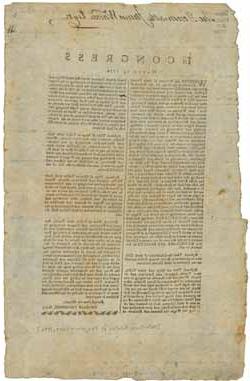In Congress March 23, 1776. Whereas the Petitions of these United Colonies to the King, for the Redress of great and manifest Grievances ...
To order an image, navigate to the full
display and click "request this image"
on the blue toolbar.
-
Choose an alternate description of this item written for these projects:
- Main description
[ This description is from the project: Coming of the American Revolution ]
The December 1775 Prohibitory Act, which severed trade between England and its colonies and removed the colonies from the King's protection, doomed colonial trade vessels to attacks by England as well as other countries. In response, Congress released this broadside declaring that American vessels would answer aggression with aggression, arming trade ships and taking English vessels as "lawful Prize."
Enemy Vessels Beware!
In December 1775, Parliament passes the Prohibitory Act, which outlaws American trade with foreign nations. All American ships (regardless of the owner's political sympathies) are considered enemy vessels that can be captured by the British Navy and declared prizes of war, their cargoes sold to the highest bidder. Declaring the colonists to be rebels and outlaws, the act removes the colonies from the king's protection. Congress learns of the act in February 1776. The question of foreign support and America's trade with foreign nations is now more important than ever. Will foreign allies dare to trade with America if American ships are subject to such hostile conditions? In March 1776, Congress takes its own decisive action in its struggle to control the seas.
Questions to Consider
1. Read the first resolution: What is its stated purpose?
Further Exploration
2. What might be the consequences of the Prohibitory Act, and the fact that the act removed the colonists from the king's protection?

